LogisShip, a leading logistics company, exemplifies efficiency in managing documents and electronic data through a robust system tailored to the complexities of the shipping and transportation industry. Here’s how LogisShip ensures seamless document management and electronic organization:
Document Management System
1. Centralized Repository: LogisShip utilizes a centralized document management system (DMS) where all relevant documents, such as invoices, shipping orders, customs forms, and client contracts, are stored. This ensures that documents are easily accessible by authorized personnel from any location.
2. Digitalization: Paper documents are digitized upon receipt using advanced scanning technology. This digital transformation not only reduces physical storage requirements but also enhances accessibility and security.
3. Version Control: The DMS incorporates version control mechanisms to track revisions and updates to documents. This feature ensures that users always have access to the latest versions of critical documents, minimizing errors and confusion.
4. Security Measures: Robust security protocols are implemented to protect sensitive information. Access to documents is restricted based on user roles and permissions, safeguarding confidential data from unauthorized access or breaches.
5. Integration with Workflow: The DMS is integrated with LogisShip’s workflow management systems, allowing seamless document flow across different departments. For example, shipping documents initiated by the operations team can be automatically forwarded to the finance department for billing.
Electronic Data Management
1. Data Warehousing: LogisShip maintains a secure data warehouse where electronic data from various operational systems, such as tracking software, fleet management tools, and customer relationship management (CRM) platforms, are stored.
2. Real-Time Data Integration: Integration technologies enable real-time updates and synchronization of data across different platforms. This capability ensures that all stakeholders have access to accurate and up-to-date information, enhancing decision-making processes.
3. Analytics and Reporting: Advanced analytics tools are employed to analyze electronic data, providing insights into operational performance, customer trends, and cost optimization opportunities. Customizable reports generated from these analyses aid in strategic planning and business forecasting.
4. Compliance and Regulatory Requirements: LogisShip adheres to industry regulations and compliance standards concerning data management. Electronic data handling practices are designed to meet data protection laws and ensure transparency with clients and regulatory authorities.
The Challenge
With manufacturing and distribution channels in literally every major market around the globe, and competing in an industry that is understandably zealous about supply chain management, was seeking a logistics partner capable of performing on a truly global scale. The service partner envisioned would not only be required to design and deliver on a model that would help contain costs.
The Solution
Such a commitment from a company of size and complexity, to globally integrate and standardize processes and manage logistics in every geographic theater, spoke volumes of the organization’s commitment to aggressively managing business costs.
The Results
People are the engine of success. Global Project Leader Export/Import stated, people at every level recognize the value of a partnership and the importance of working collaboratively. Working as one team, we’ve been able to focus on attacking costs, improving customer service, and managing continuous improvement across all aspects of our operations.



